- Home
- Pat Barker
The Women of Troy: A Novel Page 2
The Women of Troy: A Novel Read online
Page 2
Meanwhile something peculiar’s happening to Pyrrhus. Perhaps it’s just thirst, or the heat, which is worse now than it’s ever been, but he seems to be seeing the horse from the outside. He sees its head level with the roofs of palaces and temples as it’s pulled slowly through the streets. A strange feeling: to be locked fast in darkness and yet be able to see the wide streets and open squares, the crowds of excited Trojans milling around the horse’s feet. The ground’s black with them. They’re like ants that have found the chrysalis of an insect, big enough to feed their young for weeks, and they’re dragging it back to their hill in triumph, unaware that when the hard, shiny pupa splits open it’ll release death on them all.
At last, the lurching and swaying stops. By now, everybody inside the horse is feeling sick. More prayers, more hymns; the Trojans crowd into the temple of Athena to give the goddess thanks for victory. And then the feasting starts, singing, dancing, drinking, more drinking. The Greek fighters listen and wait. Pyrrhus tries to find room to stretch his legs; he has cramp in his right calf, from dehydration and sitting too long in the same constricted position. They’re in deeper darkness now, with no moon to throw light through the cracks in the horse’s sides—a moonless night was selected for the attack. Now and then a bunch of drunken revellers staggers past and their blazing torches cast tiger stripes over the faces of the men who wait inside. The light glints on helmets and breastplates and the blades of their drawn swords. Still, they wait. Out there, far out in the darkness, the black, beaked ships will be ploughing white furrows through the heaving grey sea as the Greek fleet returns. He imagines the ships entering the bay, their sails furled as the rowers take over, and then the scrape of keels on shingle as they drive hard onto the land.
Gradually, the singing and shouting die away; the last drunks have crawled home or passed out in the gutter. And Priam’s guards? Is it likely they’ll have stayed sober, now the war’s over, now they think they know they’ve won and there’s nobody left to fight?
At last, at a nod from Odysseus, four fighters at the far end draw back bolts and remove two segments of the sides. The cooler night air floods in; Pyrrhus feels his skin tingle as the sweat evaporates. And then, one by one, in a steady stream, men start to climb down the rope ladders and gather in a circle on the ground. There’s a bit of jostling at the front because each man wants the honour of being the first out. Pyrrhus doesn’t care about that; he’s one of the first, that’s enough. As his feet hit the ground, he feels the jolt all the way up his spine. People are stamping their feet, trying to get the circulation back because any minute now they’ll have to run. He grabs a torch from a sconce on the temple wall and in the glare of red light turns and looks back as the last fighters drop heavily to the ground. The horse is shitting men. Once they’re all out, they turn and stare at each other, the same half-waking expression on every face. They’re in. Slowly, the realization floods through him: an unstoppable wave. Now, at this moment, he’s standing where his father never stood, inside the walls of Troy. There’s no fear now. Everything light, everything clear. Over there, in the darkness, are the gates they’ve got to open to let the army in. Pyrrhus tightens his grip on his sword and breaks into a run.
2
An hour later, he’s on the palace steps in the thick of the fighting. Seizing an axe from a dying man, he starts hacking his way through the door. The press of fighters pushing up the steps behind him makes it hard to get a good swing—he shouts at them to get back, to give him room, and four or five blows later there’s a gap just wide enough to get through—and after that it’s easy, everything’s easy. Hurtling down the corridor, he feels his father’s blood pounding through his veins and shouts in triumph.
At the entrance to the throne room there’s a solid wall of Trojan guards, the Greek fighters already grappling with them, but he veers off to the right, searching for the secret passage that leads from Hector’s house—where his widow, Andromache, now lives alone with their son—to Priam’s private apartments. This is the information Odysseus tortured out of his captive prince. A door in the wall, half hidden by a screen, leads into a dimly lit passage shelving steeply downwards—the cold smell of musty, unused places—and then a flight of stairs takes him up into the bright light of the throne room, where Priam stands in front of an altar, motionless, expectant, as if his whole life has been a preparation for this moment. They’re alone. The sounds of Greeks and Trojans battling on the other side of the wall seem to fade away.
In silence, they stare at each other. Priam’s old, shockingly old, and so frail his armour weighs him down. Pyrrhus clears his throat, an odd, apologetic sound in that vast stillness. Time seems to have stopped, and he doesn’t know how to make it start again. He moves closer to the altar steps and announces his name, which you must do before you fight: “I am Pyrrhus, son of Achilles.” Incredibly, unforgivably, Priam smiles and shakes his head. Angry now, Pyrrhus puts one foot on the bottom step and sees Priam brace himself—though when the old man finally throws his spear it fails to penetrate the shield, just hangs there for a moment, quivering, before clattering to the floor. Pyrrhus bursts out laughing, and the sound of his own laughter frees him. He leaps up the steps, grabs a handful of Priam’s hair, drags the head back to expose the scrawny throat and—
And nothing…
For the last hour, he’s been in a state of near-frenzy, feet scarcely touching the ground, strength pouring into him from the sky—but now, when that frenzy is most needed, he feels it draining from his limbs. He raises his arm, but the sword’s heavy, heavy. Sensing weakness, Priam twists out of his grasp and tries to run, but trips and falls headlong down the steps. Pyrrhus is on to him at once, clutching the mane of silver hair, and this is it, this is it, now, now, but the hair’s unexpectedly soft, almost like a woman’s hair, and that tiny, insignificant detail’s enough to throw him. He slashes at the old man’s throat, misses—stupid, stupid—he’s like a ten-year-old boy trying to stick his first pig, hacking away, cut after cut and not one of them deep enough to kill. With his white hair and pale skin, Priam looked as if he hadn’t a drop of blood in him; oh, but he has, gallons and gallons of it, he’s slipping and slithering across the floor. At last, he gets a grip on the old bugger, kneels on his bony chest and, even then, he can’t do it. He groans in despair, “Achilles! Father!” And, incredibly, Priam turns to him and smiles again. “Achilles’s son?” he says. “You? You’re nothing like him.”
A red mist of rage gives Pyrrhus the strength to strike again. Straight into the neck this time, no mistake. Priam’s hot blood pumps over his clenched fist. That’s it. Over. He lets the body slip to the floor. Somewhere, quite close, a woman’s screaming. Bewildered, he looks around and sees a group of women, some with babies in their arms, crouched on the far side of the altar. Drunk with triumph and relief, he runs towards them, arms spread wide, and shouts “BOO!” into their faces—and laughs as they cower away.
But one girl stands up and stares back at him—goggle-eyed, face like a frog. How dare she look at him? For a moment, he’s tempted to strike her, but pulls back in time. There’s no glory to be gained by killing a woman, and anyway, he’s tired, more tired than he’s ever been in his life. His right arm dangles from his shoulder, as lifeless as a spade. Priam’s blood tightens on his skin, stinking, that fishy, ferrous smell. He stands for a moment, looking down at the body, and then on impulse kicks it in the side. No burial for Priam, he decides. No honour, no funeral rites, no dignity in death. He’ll do exactly what his father did to Hector: strap the old man’s spindly ankles to his chariot axle and drag him back to the camp. But first, he needs to get away from all the screaming and sobbing, and so, blindly, he stumbles through a door on his right.
Dark in here, cool and quiet; the cries of women sound fainter now. As his eyes grow accustomed to the gloom, he sees a rack of ceremonial robes and, beside it, a chair with the vestments of a priest draped over the back. This must be
Priam’s robing room. Standing just inside the door, he listens, feeling the room shrink away from him, just as the women did. Everything’s silent, empty. But then, suddenly, he catches a movement in the far corner. Somebody’s hiding, over there in the shadows, he can just see the outline of a shape. A woman? No, from the glimpse he had, he’s almost sure it was a man. Pushing aside the rack of clothes, he edges forward—and then almost laughs aloud with joy, with relief, because there, straight ahead of him, stands Achilles. It can’t be anybody else: the glittering armour, the flowing hair—and it’s a sign, a sign that he’s been accepted at last. He walks confidently forward, peering into the dark, and sees Achilles coming towards him, sheathed in blood; everything’s red, from his plumed helmet to his sandalled feet. Hair red too, not orange, not carroty, no, red like blood or fire. At the last moment, face to face, he reaches out and his tacky fingers encounter something hard and cold.
Close now, close, almost close enough to kiss. “Father,” he says, as his breath clouds the mirror’s shining bronze. “Father.” And again, less confidently now: “Father?”
3
We’re going
We’re going
We are going home!
I’d lost count of the number of times I’d heard that song—if you could call it a song—in the last few days. Groups of men staggering around the camp—drunk, slack-mouthed, fish-eyed—bellowing out the simple, repetitive words until their voices grew hoarse. Discipline had almost completely broken down. All over the camp, the kings were struggling to regain control of their men.
Crossing the arena one morning, I heard Odysseus shout: “If you don’t bloody well get that ship loaded, you won’t be going anywhere!” He’d come out of his hall and was standing on the steps of the veranda, confronting a group of twenty or thirty men. It was a sign of the general mood that, even there, in his own compound, he carried a spear. Most of the singers began to edge away, but then a voice shot out of the crowd. “Aye, an’ what about you, yer conniving bastard? Don’t see you lifting much.”
Thersites, of course. Who else? He hadn’t exactly stepped forward; it was more a case of the others stepping back. Odysseus was on to him immediately, spear raised high above his head. Using the butt end as a cosh, he struck Thersites repeatedly on the arms and shoulders and then, as he lay curled up and groaning on the ground, delivered several more blows to his ribs before finishing him off with a kick in the groin.
Clutching his balls, Thersites thrashed from side to side while the other men crowded round, roaring with laughter. He was well known as a shit-stirrer, a gobshite; if there was any work to be handed out, you’d always find Thersites at the back of the queue. Oh, they might get a vicarious thrill from his challenges to authority, but they’d no love for the man, no respect. So they left him lying there and wandered off, possibly to load the ship but more likely to look for fresh supplies of booze, since the goatskins slung across their shoulders appeared to be empty. A few yards further on they began singing again, though with every repetition the song sounded more and more like a dirge.
We’re going
We’re going
We are going home!
The truth? Nobody was going home. Nobody was going anywhere. Only four days ago, they’d been within an hour of departure—some of the kings, including Odysseus, had already gone on board—but then the wind suddenly veered round and started blowing at near-gale force off the sea. You’d have had to be mad to leave the shelter of the bay in that. “Oh, don’t worry,” everybody said. “It’ll soon pass.” But it hadn’t passed. Day after day, hour after hour, the freak wind blew, and so, here they all were, the victorious Greek fighters, penned in—and the captive Trojan women with them, of course.
Meanwhile, Thersites. I bent over him, trying not to recoil from the reek that blasted out of his open mouth. It pained me to think ill of a man who’d just called Odysseus a conniving bastard to his face, but really there wasn’t much to like about Thersites. Still, there he was, injured, and I was on my way to the hospital, so I put my hand under his arm and helped him to his feet. He stood doubled over for a moment, hands on knees, before slowly raising his head. “I know you,” he said. “Briseis, isn’t it?” He wiped his bloody nose on the back of his hand. “Achilles’s whore.”
“Lord Alcimus’s wife.”
“Yeah, but what about that brat you’re carrying? What does Lord Alcimus think about that, then? Tekking on another man’s bastard?”
I turned my back on him, aware all the time as I walked away of Amina trailing along behind me. Did she know the history of my marriage? Well, if she didn’t before, she certainly did now.
A couple of days before he was killed, Achilles had given me to Alcimus, explaining that Alcimus had sworn to take care of the child I was expecting. I knew nothing about this until the morning it happened. Dragged out of Achilles’s bed—a semen-stained sheet wrapped round my shoulders, breadcrumbs in my hair, feeling sick, smelling of sex—I was married to Alcimus. A strange wedding, though perfectly legal, with a priest to say the prayers and bind our hands together with the scarlet thread. And, give credit where it’s due, Alcimus had been as good as his word. Only this morning, he’d insisted I must have a woman to accompany me whenever I left the compound. “It isn’t safe,” he’d said. “You’ve got to take somebody with you.”
This girl, Amina, was the result.
We made a ridiculous little procession, me a respectable married woman, heavily veiled, Amina trotting along a few paces behind. All nonsense, of course. What protected me from the drunken gangs roaming around the camp was not the presence of a teenage girl, but the sword arm of Alcimus, as once, only five months ago, it had been the sword arm of Achilles. The only thing, the only thing, that mattered in this camp was power—and that meant, ultimately, the power to kill.
Normally, I found a walk along the shore pleasant, but not today. The wind had become a hot, moist hand pushing you away from the sea, saying: No, you can’t go there. I say “moist,” but so far there’d been no rain, though an anvil-shaped cloud towered high into the sky above the bay and, at night, you could see flickers of lightning deep inside it. Everything suggested a storm was about to break, and yet it never came. The light, a curious reddish brown, stained every bit of exposed skin bronze, until men’s hands and faces seemed to be made of the same hard, unyielding metal as their swords.
Under the celebrations—the drinking, the feasting, the dancing—I detected a current of uneasiness. This wind was beginning to saw at everybody’s nerves, like a fractious baby that just won’t go to sleep. Even at night, with all the doors shut and barred, there was no escaping it. Gusts insinuated themselves into every crack, lifting rugs, blowing out candles, pursuing you along the passage into your bedroom, even into your sleep. In the middle of the night, you’d find yourself lying awake staring at the ceiling, and all the questions you’d managed to ignore by day gathered round your bed.
What does Lord Alcimus think about that, then? Tekking on another man’s bastard?
My pregnancy was public knowledge now. The change seemed to have happened imperceptibly, rather like the drawing-in of the nights. Evening after evening, you see no real difference until suddenly there’s a chill in the air and you know it’s autumn. People’s attitudes to me had shifted with the swelling of my belly and that in turn made my own feelings about the unborn child more difficult to deal with. Achilles’s child. Achilles’s son, according to the Myrmidons, who apparently could see inside my womb. At times, I had the feeling that what I carried inside me was not a baby at all, but Achilles himself, miniaturized, reduced to the size of a homunculus, but still identifiably Achilles; and fully armed.
As we neared the gate of Agamemnon’s compound, I looked down, determinedly following the movements of my feet—in, out; in, out—as they appeared and disappeared under the hem of my tunic. I’d been so unhappy in th
is place, I always dreaded going back, but I reminded myself that the shame of being a slave in Agamemnon’s huts, in Agamemnon’s bed, belonged to the past. I was a free woman; and so, once inside the gate, I lifted my head and looked around.
We were in the main square of the compound. When I’d lived there, this had been the parade ground where the men mustered before marching off to war; now, it was occupied by a hospital tent, moved there from its original, exposed position on the beach. In its new setting, the tent looked even shabbier than before, its canvas covered in green stains, foul-smelling from long storage in the hold of a ship. This was one of the tents the Greeks had lived in for the first months of the war when they’d been arrogant enough to think Troy would be easily defeated. After their first miserable winter under canvas, they’d cut down an entire forest to build their huts.
I ducked under the open flap, pausing for a moment while my eyes adjusted to the green gloom. I thought I’d heard every sound the wind could make, but the snapping and bellowing of canvas was new. The smells were the same though: stale blood from a basket full of used bandages; a tang of fresh herbs: thyme, rosemary, lavender, bay. When I’d worked there, the tent was so overcrowded you’d had to step over one patient to reach the next. Now, it was half empty: just two rows of five or six ox-hide beds, their occupants for the most part sleeping, except for two at the far end who were playing dice. These would be men who’d been wounded in the final assault on Troy. None of them seemed to be seriously injured, except for one at the end of the front row who looked to be in a bad way. I wondered why I was even bothering to assess them; it had nothing to do with me now.
Ritsa was standing by the bench at the far end, wiping her hands on the coarse sacking apron round her waist. She smiled as I approached, but I noticed she didn’t run to meet me as she used to do.

 Border Crossing
Border Crossing The Silence of the Girls
The Silence of the Girls Life Class
Life Class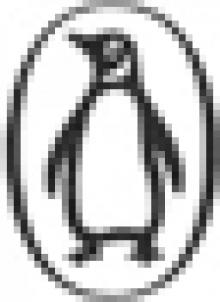 Regeneration
Regeneration Another World
Another World The Ghost Road
The Ghost Road Double Vision
Double Vision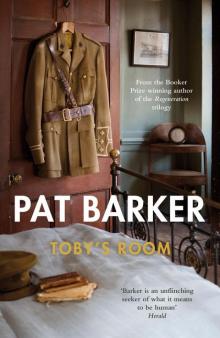 Toby's Room
Toby's Room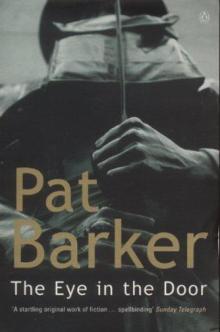 Regeneration Trilogy 02 - The Eye in the Door
Regeneration Trilogy 02 - The Eye in the Door The Eye in the Door
The Eye in the Door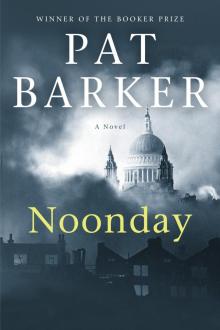 Noonday
Noonday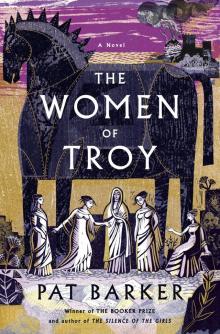 The Women of Troy: A Novel
The Women of Troy: A Novel